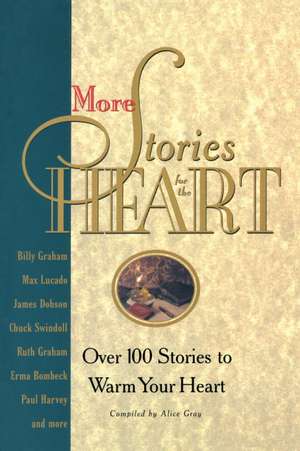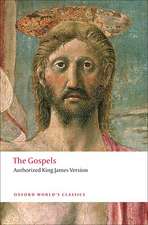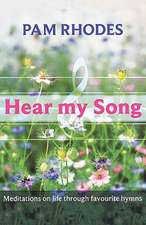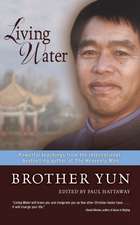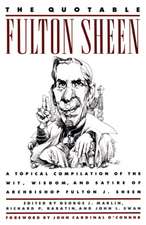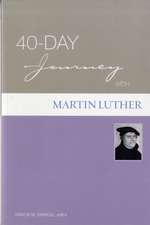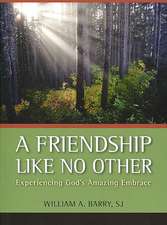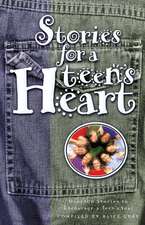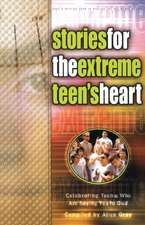More Stories for the Heart: The Second Collection: Stories for the Heart
Autor Alice Grayen Limba Engleză Paperback – 30 iun 1997
Preț: 98.96 lei
Nou
Puncte Express: 148
Preț estimativ în valută:
18.94€ • 19.84$ • 15.65£
18.94€ • 19.84$ • 15.65£
Carte disponibilă
Livrare economică 21 martie-04 aprilie
Preluare comenzi: 021 569.72.76
Specificații
ISBN-13: 9781576731420
ISBN-10: 1576731421
Pagini: 299
Dimensiuni: 140 x 215 x 22 mm
Greutate: 0.35 kg
Editura: The Doubleday Religious Publishing Group
Colecția Multnomah Books
Seria Stories for the Heart
ISBN-10: 1576731421
Pagini: 299
Dimensiuni: 140 x 215 x 22 mm
Greutate: 0.35 kg
Editura: The Doubleday Religious Publishing Group
Colecția Multnomah Books
Seria Stories for the Heart
Extras
The Day Philip Joined the Group
PAUL HARVEY with acknowledgement to Rev. Harry Pritchett Jr., rector of All Saints Episcopal Church in Atlanta, who called my attention to a boy named Philip.
He was 9—in a Sunday school class of 8-year-olds.
Eight-year-olds can be cruel.
The third-graders did not welcome Philip to their group. Not just because
he was older. He was “different.”
He suffered from Down’s syndrome and its obvious manifestations:
facial characteristics, slow responses, symptoms of retardation.
One Sunday after Easter the Sunday school teacher gathered some of
those plastic eggs that pull apart in the middle—the kind in which some
ladies’ pantyhose are packaged.
The Sunday school teacher gave one of these plastic eggs to each
child.
On that beautiful spring day each child was to go outdoors and discover
for himself some symbol of “new life” and place that symbolic seed
or leaf or whatever inside his egg.
They would then open their eggs one by one, and each youngster
would explain how his find was a symbol of “new life.”
So…
The youngsters gathered ’round on the appointed day and put their
eggs on a table, and the teacher began to open them.
One child had found a flower.
All the children “oohed” and “aahed” at the lovely symbol of new life.
In another was a butterfly. “Beautiful,” the girls said. And it’s not easy
for an 8-year-old to say “beautiful.”
Another egg was opened to reveal a rock. Some of the children
laughed.
“That’s crazy!” one said. “How’s a rock supposed to be like a ‘new
life’?”
Immediately a little boy spoke up and said, “That’s mine. I knew
everybody would get flowers and leaves and butterflies and all that stuff,
so I got a rock to be different.”
Everyone laughed.
The teacher opened the last one, and there was nothing inside.
“That’s not fair,” someone said. “That’s stupid,” said another.
Teacher felt a tug on his shirt. It was Philip. Looking up he said, “It’s
mine. I did do it. It’s empty. I have new life because the tomb is empty.”
The class fell silent.
From that day on Philip became part of the group. They welcomed
him. Whatever had made him different was never mentioned again.
Philip’s family had known he would not live a long life; just too many
things wrong with the tiny body. That summer, overcome with infection,
Philip died.
On the day of his funeral nine 8-year-old boys and girls confronted
the reality of death and marched up to the altar—not with flowers.
Nine children with their Sunday school teacher placed on the casket
of their friend their gift of love—an empty egg.
A Song in the Dark
MAX LUCADO, from God Came Near
On any other day, I probably wouldn’t have stopped. Like
the majority of people on the busy avenue, I would
hardly have noticed him standing there. But the very thing on my mind
was the very reason he was there, so I stopped.
I’d just spent a portion of the morning preparing a lesson out of the
ninth chapter of John, the chapter that contains the story about the man
blind from birth. I’d finished lunch and was returning to my office when
I saw him. He was singing. An aluminum cane was in his left hand; his
right hand was extended and open, awaiting donations. He was blind.
After walking past him about five steps, I stopped and mumbled
something to myself about the epitome of hypocrisy and went back in his
direction. I put some change in his hand. “Thank you,” he said and then
offered me a common Brazilian translation, “and may you have health.”
Ironic wish.
Once again I started on my way. Once again the morning’s study of
John 9 stopped me. “Jesus saw a man, blind from birth.” I paused and
pondered. If Jesus were here he would see this man. I wasn’t sure what
that meant. But I was sure I hadn’t done it. So I turned around again.
As if the giving of a donation entitled me to do so, I stopped beside a
nearby car and observed. I challenged myself to see him. I would stay here
until I saw more than a sightless indigent on a busy thoroughfare in
downtown Rio de Janeiro.
I watched him sing. Some beggars grovel in a corner cultivating pity.
Others unashamedly lay their children on blankets in the middle of the
sidewalk thinking that only the hardest of hearts would ignore a dirty,
naked infant asking for bread.
But this man did none of that. He stood. He stood tall. And he sang.
Loudly. Even proudly. All of us had more reason to sing than he, but he
was the one singing. Mainly, he sang folk songs. Once I thought he was
singing a hymn, though I wasn’t sure.
His husky voice was out of place amid the buzz of commerce. Like a
sparrow who found his way into a noisy factory, or a lost fawn on an interstate,
his singing conjured up an awkward marriage between progress and
simplicity.
The passersby had various reactions. Some were curious and gazed
unabashedly. Others were uncomfortable. They were quick to duck their
heads or walk in a wider circle. “No reminders of harshness today, please.”
Most, however, hardly noticed him. Their thoughts were occupied, their
agendas were full and he was…well, he was a blind beggar.
I was thankful he couldn’t see the way they looked at him.
After a few minutes, I went up to him again. “Have you had any
lunch?” I asked. He stopped singing. He turned his head toward the
sound of my voice and directed his face somewhere past my ear. His eye
sockets were empty. He said he was hungry. I went to a nearby restaurant
and bought him a sandwich and something cold to drink.
When I came back he was still singing and his hands were still empty.
He was grateful for the food. We sat down on a nearby bench. Between
bites he told me about himself. Twenty-eight years old. Single. Living with
his parents and seven brothers. “Were you born blind?”
“No, when I was young I had an accident.” He didn’t volunteer any
details and I didn’t have the gall to request them.
Though we were almost the same age, we were light-years apart. My
three decades had been a summer vacation of family excursions, Sunday
school, debate teams, football, and a search for the Mighty One. Growing
up blind in the Third World surely offered none of these. My daily concern
now involved people, thoughts, concepts, and communication. His
day was stitched with concerns of survival: coins, handouts, and food. I’d
go home to a nice apartment, a hot meal, and a good wife. I hated to think
of the home he would encounter. I’d seen enough overcrowded huts on
the hills of Rio to make a reasonable guess. And his reception…would
there be anyone there to make him feel special when he got home?
I came whisker-close to asking him, “Does it make you mad that I’m
not you?” “Do you ever lie awake at night wondering why the hand you
were dealt was so different from the one given a million or so others born
thirty years ago?”
I wore a shirt and tie and some new shoes. His shoes had holes and his
coat was oversized and bulky. His pants gaped open from a rip in the knee.
And still he sang. Though a sightless, penniless hobo, he still found
a song and sang it courageously. (I wondered which room in his heart that
song came from.)
At worst, I figured, he sang from desperation. His song was all he had.
Even when no one gave any coins, he still had his song. Yet he seemed too
peaceful to be singing out of self-preservation.
Or perhaps he sang from ignorance. Maybe he didn’t know what he
had never had.
No, I decided the motivation that fit his demeanor was the one you’d
least expect. He was singing from contentment. Somehow this eyeless
pauper had discovered a candle called satisfaction and it glowed in his
dark world. Someone had told him, or maybe he’d told himself, that
tomorrow’s joy is fathered by today’s acceptance. Acceptance of what, at
least for the moment, you cannot alter.
I looked up at the Niagara of faces that flowed past us. Grim.
Professional. Some determined. Some disguised. But none were singing,
not even silently. What if each face were a billboard that announced the
true state of the owner’s heart? How many would say “Desperate! Business
on the rocks!” or “Broken: In Need of Repair,” or “Faithless, Frantic, and
Fearful”? Quite a few.
The irony was painfully amusing. This blind man could be the most
peaceful fellow on the street. No diploma, no awards, and no future—at
least in the aggressive sense of the word. But I wondered how many in that
urban stampede would trade their boardrooms and blue suits in a second
for a chance to drink at this young man’s well.
“Faith is the bird that sings while it is yet dark.”
Before I helped my friend back to his position, I tried to verbalize my
empathy. “Life is hard, isn’t it?” A slight smile. He again turned his face
toward the direction of my voice and started to respond, then paused and
said, “I’d better get back to work.”
For almost a block, I could hear him singing. And in my mind’s eye I
could still see him. But the man I now saw was a different one than the
one to whom I’d given a few coins. Though the man I now saw was still
sightless, he was remarkably insightful. And though I was the one with
eyes, it was he who gave me a new vision.
PAUL HARVEY with acknowledgement to Rev. Harry Pritchett Jr., rector of All Saints Episcopal Church in Atlanta, who called my attention to a boy named Philip.
He was 9—in a Sunday school class of 8-year-olds.
Eight-year-olds can be cruel.
The third-graders did not welcome Philip to their group. Not just because
he was older. He was “different.”
He suffered from Down’s syndrome and its obvious manifestations:
facial characteristics, slow responses, symptoms of retardation.
One Sunday after Easter the Sunday school teacher gathered some of
those plastic eggs that pull apart in the middle—the kind in which some
ladies’ pantyhose are packaged.
The Sunday school teacher gave one of these plastic eggs to each
child.
On that beautiful spring day each child was to go outdoors and discover
for himself some symbol of “new life” and place that symbolic seed
or leaf or whatever inside his egg.
They would then open their eggs one by one, and each youngster
would explain how his find was a symbol of “new life.”
So…
The youngsters gathered ’round on the appointed day and put their
eggs on a table, and the teacher began to open them.
One child had found a flower.
All the children “oohed” and “aahed” at the lovely symbol of new life.
In another was a butterfly. “Beautiful,” the girls said. And it’s not easy
for an 8-year-old to say “beautiful.”
Another egg was opened to reveal a rock. Some of the children
laughed.
“That’s crazy!” one said. “How’s a rock supposed to be like a ‘new
life’?”
Immediately a little boy spoke up and said, “That’s mine. I knew
everybody would get flowers and leaves and butterflies and all that stuff,
so I got a rock to be different.”
Everyone laughed.
The teacher opened the last one, and there was nothing inside.
“That’s not fair,” someone said. “That’s stupid,” said another.
Teacher felt a tug on his shirt. It was Philip. Looking up he said, “It’s
mine. I did do it. It’s empty. I have new life because the tomb is empty.”
The class fell silent.
From that day on Philip became part of the group. They welcomed
him. Whatever had made him different was never mentioned again.
Philip’s family had known he would not live a long life; just too many
things wrong with the tiny body. That summer, overcome with infection,
Philip died.
On the day of his funeral nine 8-year-old boys and girls confronted
the reality of death and marched up to the altar—not with flowers.
Nine children with their Sunday school teacher placed on the casket
of their friend their gift of love—an empty egg.
A Song in the Dark
MAX LUCADO, from God Came Near
On any other day, I probably wouldn’t have stopped. Like
the majority of people on the busy avenue, I would
hardly have noticed him standing there. But the very thing on my mind
was the very reason he was there, so I stopped.
I’d just spent a portion of the morning preparing a lesson out of the
ninth chapter of John, the chapter that contains the story about the man
blind from birth. I’d finished lunch and was returning to my office when
I saw him. He was singing. An aluminum cane was in his left hand; his
right hand was extended and open, awaiting donations. He was blind.
After walking past him about five steps, I stopped and mumbled
something to myself about the epitome of hypocrisy and went back in his
direction. I put some change in his hand. “Thank you,” he said and then
offered me a common Brazilian translation, “and may you have health.”
Ironic wish.
Once again I started on my way. Once again the morning’s study of
John 9 stopped me. “Jesus saw a man, blind from birth.” I paused and
pondered. If Jesus were here he would see this man. I wasn’t sure what
that meant. But I was sure I hadn’t done it. So I turned around again.
As if the giving of a donation entitled me to do so, I stopped beside a
nearby car and observed. I challenged myself to see him. I would stay here
until I saw more than a sightless indigent on a busy thoroughfare in
downtown Rio de Janeiro.
I watched him sing. Some beggars grovel in a corner cultivating pity.
Others unashamedly lay their children on blankets in the middle of the
sidewalk thinking that only the hardest of hearts would ignore a dirty,
naked infant asking for bread.
But this man did none of that. He stood. He stood tall. And he sang.
Loudly. Even proudly. All of us had more reason to sing than he, but he
was the one singing. Mainly, he sang folk songs. Once I thought he was
singing a hymn, though I wasn’t sure.
His husky voice was out of place amid the buzz of commerce. Like a
sparrow who found his way into a noisy factory, or a lost fawn on an interstate,
his singing conjured up an awkward marriage between progress and
simplicity.
The passersby had various reactions. Some were curious and gazed
unabashedly. Others were uncomfortable. They were quick to duck their
heads or walk in a wider circle. “No reminders of harshness today, please.”
Most, however, hardly noticed him. Their thoughts were occupied, their
agendas were full and he was…well, he was a blind beggar.
I was thankful he couldn’t see the way they looked at him.
After a few minutes, I went up to him again. “Have you had any
lunch?” I asked. He stopped singing. He turned his head toward the
sound of my voice and directed his face somewhere past my ear. His eye
sockets were empty. He said he was hungry. I went to a nearby restaurant
and bought him a sandwich and something cold to drink.
When I came back he was still singing and his hands were still empty.
He was grateful for the food. We sat down on a nearby bench. Between
bites he told me about himself. Twenty-eight years old. Single. Living with
his parents and seven brothers. “Were you born blind?”
“No, when I was young I had an accident.” He didn’t volunteer any
details and I didn’t have the gall to request them.
Though we were almost the same age, we were light-years apart. My
three decades had been a summer vacation of family excursions, Sunday
school, debate teams, football, and a search for the Mighty One. Growing
up blind in the Third World surely offered none of these. My daily concern
now involved people, thoughts, concepts, and communication. His
day was stitched with concerns of survival: coins, handouts, and food. I’d
go home to a nice apartment, a hot meal, and a good wife. I hated to think
of the home he would encounter. I’d seen enough overcrowded huts on
the hills of Rio to make a reasonable guess. And his reception…would
there be anyone there to make him feel special when he got home?
I came whisker-close to asking him, “Does it make you mad that I’m
not you?” “Do you ever lie awake at night wondering why the hand you
were dealt was so different from the one given a million or so others born
thirty years ago?”
I wore a shirt and tie and some new shoes. His shoes had holes and his
coat was oversized and bulky. His pants gaped open from a rip in the knee.
And still he sang. Though a sightless, penniless hobo, he still found
a song and sang it courageously. (I wondered which room in his heart that
song came from.)
At worst, I figured, he sang from desperation. His song was all he had.
Even when no one gave any coins, he still had his song. Yet he seemed too
peaceful to be singing out of self-preservation.
Or perhaps he sang from ignorance. Maybe he didn’t know what he
had never had.
No, I decided the motivation that fit his demeanor was the one you’d
least expect. He was singing from contentment. Somehow this eyeless
pauper had discovered a candle called satisfaction and it glowed in his
dark world. Someone had told him, or maybe he’d told himself, that
tomorrow’s joy is fathered by today’s acceptance. Acceptance of what, at
least for the moment, you cannot alter.
I looked up at the Niagara of faces that flowed past us. Grim.
Professional. Some determined. Some disguised. But none were singing,
not even silently. What if each face were a billboard that announced the
true state of the owner’s heart? How many would say “Desperate! Business
on the rocks!” or “Broken: In Need of Repair,” or “Faithless, Frantic, and
Fearful”? Quite a few.
The irony was painfully amusing. This blind man could be the most
peaceful fellow on the street. No diploma, no awards, and no future—at
least in the aggressive sense of the word. But I wondered how many in that
urban stampede would trade their boardrooms and blue suits in a second
for a chance to drink at this young man’s well.
“Faith is the bird that sings while it is yet dark.”
Before I helped my friend back to his position, I tried to verbalize my
empathy. “Life is hard, isn’t it?” A slight smile. He again turned his face
toward the direction of my voice and started to respond, then paused and
said, “I’d better get back to work.”
For almost a block, I could hear him singing. And in my mind’s eye I
could still see him. But the man I now saw was a different one than the
one to whom I’d given a few coins. Though the man I now saw was still
sightless, he was remarkably insightful. And though I was the one with
eyes, it was he who gave me a new vision.
Notă biografică
Alice Gray is an inspirational conference speaker and the creator and compiler of the bestselling Stories for the Heart book series, with more than 5 million in print. She and her husband, Al, live in Arizona.
